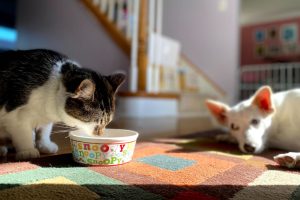Baby cats, also known as kittens, are adorable little creatures that bring so much joy and happiness into our lives. However, it can be concerning when they experience health issues such as diarrhea. As a cat parent, it’s important to understand why baby cats get diarrhea so you can help them feel better and thrive.
As a cat parent, it’s essential to be informed about common health issues that may affect your furry friend. One of these issues is diarrhea. There are several reasons why baby cats may experience diarrhea, from dietary changes to underlying health conditions. By understanding the causes of diarrhea in baby cats, you can take the necessary steps to help them recover and prevent future episodes.
Diet and Nutrition
Proper diet plays a crucial role in the overall health of baby cats. Sudden changes in diet can upset their sensitive stomachs and lead to diarrhea. When transitioning a baby cat to a new food, it’s important to do so gradually to allow their digestive system to adjust. High-quality kitten food that is specifically formulated for their age group is essential. Make sure to provide fresh water at all times to keep them hydrated. Avoid feeding them human food, as it can be too rich and difficult for their stomachs to digest.
One key aspect to consider is food allergies. Just like humans, cats can develop allergies to certain ingredients in their food. If your baby cat is experiencing diarrhea, it might be worth looking into common allergens such as wheat, soy, or dairy. Keeping a close eye on their diet and any possible allergens can help prevent diarrhea episodes.
Stress and Anxiety
Stress and anxiety can have a significant impact on a baby cat’s digestive system, leading to diarrhea. Cats are sensitive animals and can easily become stressed by changes in their environment or routine. Loud noises, new pets, or even a change in their feeding schedule can trigger stress and anxiety. This can result in gastrointestinal upset and diarrhea.
One way to help reduce stress in baby cats is to create a safe and secure environment for them. Providing enrichment such as toys, scratching posts, and climbing trees can help keep them occupied and mentally stimulated. Additionally, setting a consistent daily routine can help them feel more at ease and reduce their overall stress levels.
It’s also important to give your baby cat plenty of love and attention to help them feel comforted and secure. Spending quality time with them through play and cuddling can go a long way in alleviating their stress and reducing the chances of diarrhea. If stress and anxiety persist, consider consulting with your veterinarian for further guidance and support.
For more information on cat care and nutrition, check out this resource from the American Society for the Prevention of Cruelty to Animals (ASPCA): ASPCA Cat Nutrition Tips.
Parasites and Infections
When baby cats have diarrhea, parasites and infections could be the culprits behind their tummy woes. Common parasites like Giardia or Coccidia can upset your fur baby’s digestive system, leading to loose stools. These pesky critters often sneak into a kitten’s system through contaminated food, water, or contact with infected animals. Infections caused by bacteria such as Salmonella or E. coli can also trigger diarrhea in young felines. To tackle these issues, consult your vet for proper diagnostic tests and medication tailored to your little one’s needs. Remember, a proactive approach to tackling parasites and infections can help your baby cat bounce back to health quicker.
Dehydration
When baby cats experience diarrhea, dehydration becomes a lurking danger. Dehydration can occur rapidly in kittens due to their small size and vulnerability. To combat this risk, ensure your baby cat has access to fresh water at all times. Watch for signs of dehydration like lethargy, sunken eyes, or dry gums. Encourage your furry friend to drink more by offering wet food or water with a syringe if needed. Monitor your baby cat’s hydration levels closely and seek veterinary attention promptly if you suspect dehydration. Remember, staying hydrated is crucial for your little one’s health and recovery.
- Offer electrolyte solutions: Electrolyte solutions like Pedialyte can help replenish lost nutrients and fluids during bouts of diarrhea.
- Limit dairy products: Dairy can worsen diarrhea in some baby cats due to lactose intolerance. Opt for lactose-free alternatives instead.
- Provide bland food: Offer easily digestible foods like boiled chicken or rice to soothe your kitten’s upset stomach.
- Consult your vet: If diarrhea persists for more than a day or is accompanied by other concerning symptoms, seek professional guidance promptly.
By addressing parasites, infections, and dehydration promptly, you can help your baby cat overcome diarrhea and get back to playful antics in no time. Remember, your vigilant care is key to ensuring your fur baby’s well-being.
Veterinary Care
If your baby cat is experiencing diarrhea, it’s crucial to seek veterinary care promptly. Diarrhea in young kittens can lead to dehydration and other serious health issues if left untreated. When you visit the vet, they will likely conduct a physical exam to determine the underlying cause of the diarrhea. They may also recommend tests such as fecal exams or blood work to rule out any infections or parasites. Treatment may include medications to address the specific cause of diarrhea, as well as fluids to prevent dehydration. Remember, early intervention is key to ensuring your baby cat’s health and well-being.
Home Remedies
While it’s essential to seek veterinary care for baby cats with diarrhea, there are some natural home remedies that may help alleviate symptoms. Probiotics can help restore the balance of good bacteria in your kitten’s gut. Pumpkin puree, with its high fiber content, can also help firm up stools. Additionally, boiled chicken or rice can be gentle on your kitten’s stomach and provide easily digestible nourishment. However, it’s crucial to consult your vet before trying any home remedies to ensure they are safe and appropriate for your baby cat’s specific situation. Remember, always prioritize your kitten’s health and well-being above all else.
Prevention Tips
Diarrhea in baby cats can often be prevented by ensuring they have a proper diet and good hygiene. Feeding your baby cat high-quality kitten food specifically designed for their nutritional needs can help prevent digestive issues. Avoid giving them table scraps or foods that are not suitable for cats, as these can upset their stomachs. Regularly cleaning your kitten’s litter box and keeping their living environment clean can also prevent them from ingesting harmful bacteria that can lead to diarrhea. Ensuring your baby cat stays hydrated is crucial, so always provide fresh water for them to drink. Lastly, gradually transitioning to new foods can help prevent digestive upset, so introduce new foods slowly to avoid gastrointestinal issues.
- Monitor their stools: Keep an eye on your baby cat’s bowel movements to catch any changes early.
- Probiotics: Consider adding probiotics to your kitten’s diet to promote good gut health and prevent diarrhea.
When to Be Concerned
While occasional diarrhea in baby cats may not be a cause for alarm, there are times when it can indicate a more serious health issue. Persistent diarrhea that lasts for more than a day, bloody stools, lethargy, vomiting, loss of appetite, or dehydration are all signs that your baby cat needs immediate veterinary attention. Diarrhea can be a symptom of various health issues such as parasites, infections, food allergies, or digestive disorders, so it’s crucial to seek professional help if you notice these symptoms in your kitten.
Additional tip: If you suspect your baby cat has diarrhea, it’s essential to consult your veterinarian for a proper diagnosis and treatment plan. Delaying treatment could lead to further health complications for your furry friend.
Alex, a passionate animal lover, has experience in training and understanding animal behavior. As a proud pet parent to two dogs and three cats, he founded AnimalReport.net to share insights from animal experts and expand his knowledge of the animal kingdom.




